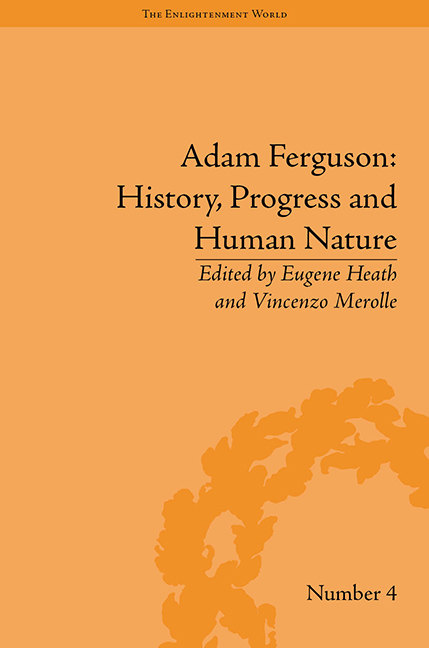Book contents
- Frontmatter
- CONTENTS
- Contributors
- Introduction
- I Life and Works
- II In History
- 4 Ferguson's Reflections Previous to the Establishment of a Militia
- 5 Ferguson's Views on the American and French Revolutions
- 6 Political Education for Empire and Revolution
- III On History
- IV Human Nature, Action and Progress
- Notes
- Works Cited
- Index
4 - Ferguson's Reflections Previous to the Establishment of a Militia
from II - In History
- Frontmatter
- CONTENTS
- Contributors
- Introduction
- I Life and Works
- II In History
- 4 Ferguson's Reflections Previous to the Establishment of a Militia
- 5 Ferguson's Views on the American and French Revolutions
- 6 Political Education for Empire and Revolution
- III On History
- IV Human Nature, Action and Progress
- Notes
- Works Cited
- Index
Summary
In the spring of 1755, after serving a decade as chaplain to the Black Watch Regiment, Ferguson took a leave of absence from his position and returned to Scotland. The regiment had seen action on the continent at Port l'Orient and Flanders, but for about six years had been reduced and quartered in Ireland. Hostilities between France and Great Britain had recommenced in North America in 1754, and two Irish regiments had been sent there in the spring of that year. The Seven Years War broke out with the French capture of the island of Minorca in May 1756, and within a year Ferguson's regiment would depart for North America without him.
In the spring of 1756 there was a great alarm over the possibility of a French invasion of England. Since there were only 35,000 regular soldiers stationed in Great Britain, and there was no militia, the government took the unusual measure of bringing over 8,600 Hanoverian and 6,500 Hessian soldiers at a cost of over £300,000 if they were sent home by Christmas, but much more if they stayed longer. The employment of foreign mercenary troops was not only an expensive measure, but one which some worried might become permanent, while many feared that it would be repeated every time that France threatened to invade. Many Englishmen felt ashamed that they needed to depend upon foreign auxiliaries for their defence. The Speaker of the House of Commons caught the tone of the nation in his address to the King: ‘Subsides to foreign princes, when already burdened by a debt scarce to be borne, cannot but be severely felt; an army of foreign troops, a thing unprecedented, unheard of, unknown, brought into England, cannot but alarm’. The time was ripe for reviving the militia: not as an alternative to the regular army, but as a supplement to it.
‘A Bill for the better ordering of the Militia Forces in the several counties of that part of Great Britain, called England’ had been introduced in Parliament at the beginning of the year by George Townshend, MP for Norfolk, and was readily approved by the Commons.
- Type
- Chapter
- Information
- Adam FergusonHistory, Progress and Human Nature, pp. 65 - 72Publisher: Pickering & ChattoFirst published in: 2014



